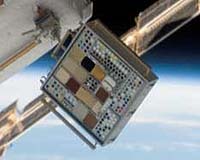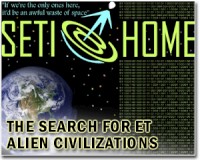|
 Distant Star's Sound Waves Reveal Cycle Similar To Sun
Distant Star's Sound Waves Reveal Cycle Similar To SunWashington DC (SPX) Aug 30, 2010 In a bid to unlock long-standing mysteries of the sun, including the impacts on Earth of its 11-year cycle, an international team of scientists has successfully probed a distant star. By monitoring the star's sound waves, the team has observed a magnetic cycle analogous to the sun's solar cycle. Results of the study, conducted by scientists at the U.S. National Center for Atmospheric Research (NCAR) in Boulder, Colo., and colleagues in France and Spain, are published this week in the journal ... read more |
. |
|
|
Free Space, Earth, Energy And Military Newsletters - Delivered Daily |
| . | . |
| .. |
Space detector prepares to scour universe for secrets Geneva (AFP) Aug 25, 2010
Geneva (AFP) Aug 25, 2010A huge physics detector that will scour outer space for clues to the origins of the universe began the first stage of its voyage to the International Space Station at Geneva airport on Wednesday. The European Organisation for Nuclear Research (CERN) loaded the Alpha Magnetic Spectrometer (AMS) onto a giant C5 Galaxy US military transport plane, which will fly it to the Kennedy Space Centre i ... more NASA prepares for asteroid rendezvous  Pasadena, Calif. (UPI) Aug 24, 2010
Pasadena, Calif. (UPI) Aug 24, 2010 NASA is getting ready for its Dawn spacecraft's encounter with a giant asteroid, set to happen in less than a year, the agency said. Dawn will conduct a detailed study as it spends a year circling the asteroid Vesta, becoming the first spacecraft to orbit a body in the solar system's asteroid belt, SPACE.com reported Tuesday. There have been previous missions to asteroids, but sc ... more Solar System May Be 2 Million Years Older Than We Thought  Mesa AZ (SPX) Aug 26, 2010
Mesa AZ (SPX) Aug 26, 2010Timescales of early Solar System processes rely on precise, accurate and consistent ages obtained with radiometric dating. However, recent advances in instrumentation now allow scientists to make more precise measurements, some of which are revealing inconsistencies in the ages of samples. Seeking better constraints on the age of the Solar System, Arizona State University researchers Audre ... more |
.. |
 British bacteria are hardy space travelers  SETI search may be seeking wrong target  Instant online solar energy quotes Solar Energy Solutions from ABC Solar |
.. |
|
|
Free Space, Earth, Energy And Military Newsletters - Delivered Daily |
|
|
. |
 Fermi Detects Gamma-Rays From Exploding Nova
Fermi Detects Gamma-Rays From Exploding NovaWashington DC (SPX) Aug 24, 2010 Using the Large Area Telescope (LAT) onboard NASA's Fermi Gamma-ray Space Telescope satellite, astronomers have detected gamma rays from a nova for the first time, a finding that surprises both observers and theorists. The discovery dispels the long-held idea that nova explosions are not powerful enough to produce such high-energy radiation. These findings are published in Science with Teddy Cheung, an astrophysicist at the Naval Research Laboratory, as the lead author. A nova is a sudden, r ... read more |
| The contents herein, unless otherwise known to be public domain, are Copyright 1995-2010 - SpaceDaily. AFP and UPI Wire Stories are copyright Agence France-Presse and United Press International. ESA Portal Reports are copyright European Space Agency. All NASA sourced material is public domain. Additional copyrights may apply in whole or part to other bona fide parties. Advertising does not imply endorsement, agreement or approval of any opinions, statements or information provided by SpaceDaily on any web page published or hosted by SpaceDaily. Privacy statement |
| Previous Issues | Aug 27 | Aug 26 | Aug 25 | Aug 24 | Aug 23 |